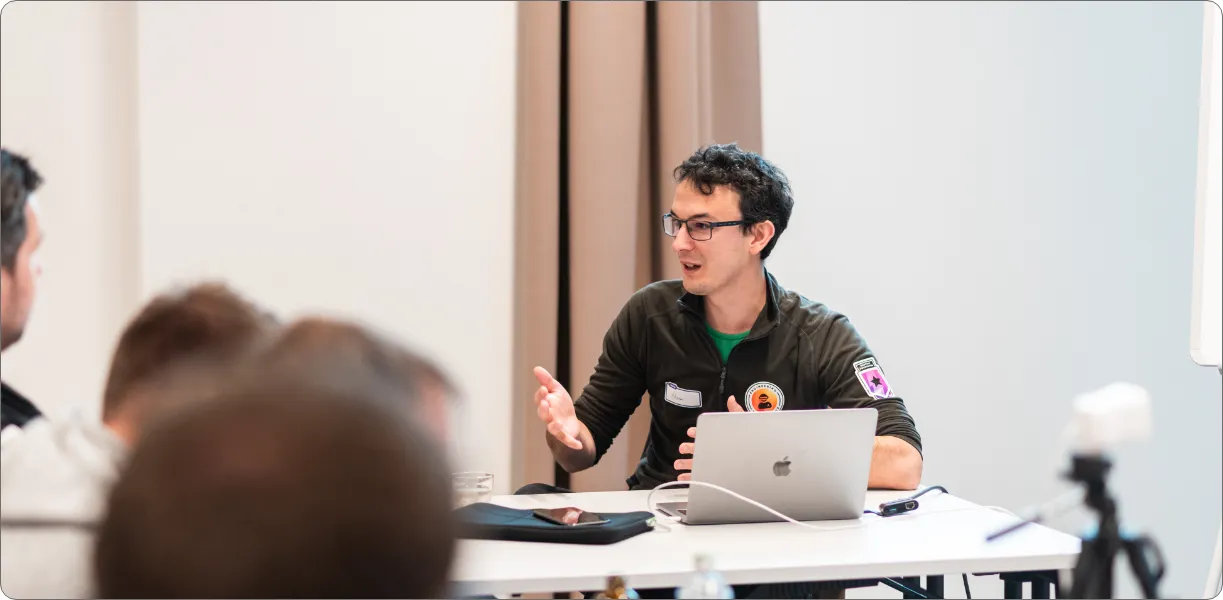Everyone has a story to tell. Lucky for us, our colleagues have led some fascinating lives with plenty of hanging-on-every-word stories!
For our last Ataccama Origins story, we gathered around to hear from our Data Governance Spaceport Leader David Kolinek (jog your memory about our Spaceports over on our SpaceUP blog) and got a glimpse of his life before joining our team.
We’re keeping the series chugging right along with an interview with our Product Foundation Spaceport Leader Adam Stanek, who tells us how he got started in the developing world, and how his approach to work has changed in his four years with Ataccama. Enjoy!
“When I was 18 and in high school, there were a lot of people around me who were also interested in various software projects. I was on a track where I was asked to do different kinds of jobs. I specialized in web development, but honestly, I was doing pretty much anything from desktop applications, server applications to programming single chips.”
He continued on this exploratory path after school, honing his skills and even taking on projects based abroad.
“I had a year between my studies at college when I was drafting some prototypes to be used for lighting city infrastructure in Switzerland. This was a key moment in my career because I completely switched my focus and proved that I can follow even more niche markets. Ultimately I decided to turn my attention back to developing web-based applications and my own products — primarily CMS. At that time web-app development was growing so much, I just couldn’t let it pass. But it gave me a great perspective.”
“I was kind of jumping between technologies. In every project I worked on I was trying to learn something new, to try something which was fancy at the time, something which could help me grow as a technologist. The developer within me loved it! During this time I became proficient in 12 programming languages and doing crazy stuff like building over Nginx to tackle 10k connection limits over commodity hardware. I really loved that time.”

Adam later decided to part ways with his previous projects to join a company. But after running his own business, he wanted to be sure the team he worked with was the perfect fit.
“If I think back to what turned me onto Ataccama, it’s because I struggled to scale the company at that time. I was focusing on technological excellence. I strongly believed in making a product in the best possible way. With that mindset I was not correctly aligned with the target market which was moving towards agility and quick prototyping.”
“I was also having problems with building my own team. We were still a small company and we had a lot of fluctuation. Many people I employed were doing their studies so they were working with me for maybe a year or so. And I saw myself investing a lot of time into teaching people but it wasn’t really helping me in the long term. The onboarding was very demanding due to so many technologies being involved. I learned an important lesson at that time. It turned out that what was a good thing for me to grow as a developer was not the right thing for me to run a company. I wanted to break the pattern, to be in an environment where I could focus on bigger projects than I could deliver with less than 10 people.”
Adam ended up finding exactly this at Ataccama.
“I was able to keep my sense of ownership but work on bigger problems with more people involved. People with great minds and interesting perspectives to hone my own.”
“As I mentioned, I was used to working on my own products from the beginning. It was really important for me to have this kind of ownership and the ability to shape things my own way. At the time I was afraid I was going to lose that. But the opposite happened. I started as a developer at Ataccama and saw some things I didn’t like. But I was able to change them pretty much immediately.”
“The people I worked with were really open and I became quickly involved in shaping how we moved in engineering and later in product development. I could see behind the curtains. I was able to find the reasoning why we were doing something, and if it was the right thing for the customer — which was something I was used to doing. I loved solutioning with my former customers. The fact that I can come up with something which makes their life easier is what drove me forward. I couldn’t imagine losing that and I was pleasantly surprised with Ataccama in that way. I was able to keep my sense of ownership but work on bigger problems with more people involved. People with great minds and interesting perspectives to hone my own.”
When you’ve worked with someone long enough you begin to notice their overarching (or even subtle) approaches to working. One particular trait that others admire about Adam as a colleague is his ability to always maintain a balance between focusing on technology and solutions, while keeping business priorities in mind.
“I love connecting the product perspective with development. My past experience gave me the opportunity to stand on both sides of a barricade. This is what I believe is my mission even in Ataccama. To break that barricade down. What I learned in Ataccama is doing it at scale.”
“Before my work at Ataccama I always had to be very careful about how we approach product increments. We have strived for projects usually delivered by companies three or four times of our size. We only could do that by careful planning and designing the increments hand in hand with a customer. We also had to be pretty aware of any hidden engineering costs because any inefficiency or costly maintenance could kill us in the long run.”
“With Ataccama I jumped into a completely different playground. It is really a different story thinking about this stuff with an engineering team of 200 people. I had to learn to take into account cross dependencies, cost of communication or even persuasion of people to buy-in on your ideas. All of that became my daily bread and the only way I believe this can be done efficiently is by maintaining the business perspective.”

Moving into an entirely different kind of working environment was a major shift, but had several benefits. A new environment meant growth in ways that couldn’t have happened if Adam stayed at his previous company.
“I was in a completely different position back then. In my own company, every project started and ended with me. I was able to say what the feature is and what it should look like, then solution it together with the team. Looking back, it was easy. We worked on really challenging problems, but I had complete control over it and saw the full picture.”
“In Ataccama, I actually had to learn how to convince people and motivate them so that they see the value in doing a certain thing. To see that we are building a platform to last. That we want to do it right so that we can benefit from it in the long run. It’s difficult to build this kind of mindset. And I absolutely loved that I am able to do that here. First I had a chance to do it as Head of Frontend, later in my position as a Spaceport leader. Both roles were unique experiences to me and I have learned many lessons.”
Adam found that he also had to completely change how he finds answers to problems.
“Whenever I was facing a problem we couldn’t pass through, I just cut off for a day or two to come up with a solution. This is just something I cannot afford. Not only can I not put 30 people on hold just for me to come up with something, but also I can’t possibly be an expert on every topic we encounter. Instead, I am trying to surround myself with people who actually are and enable them to have everything they need to move us forward, ideally learning a thing or two for myself in the process.”
“I think this was the thing that completely changed how I approach problems today. Looking back I know now that what I was doing before couldn’t work on a bigger scale. I am really glad I had the opportunity to move past that.”
That was our quick recap of how Adam got started in his career and made his way to Ataccama. Tune in next time to hear from another one of our Spaceport leaders and take a peek at their careers so far.
Do you find a bit of yourself in Adam’s story? Want to see what it’d be like to explore your passions with like-minded professionals? Join his team! Take a look at our open positions and see where you will thrive.

